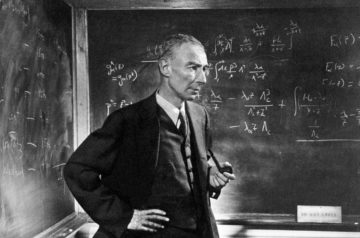Adrian Cho in Science:
 This week, the much anticipated movie Oppenheimer hits theaters, giving famed filmmaker Christopher Nolan’s take on the theoretical physicist who during World War II led the Manhattan Project to develop the first atomic bomb. J. Robert Oppenheimer, who died in 1967, is known as a charismatic leader, eloquent public intellectual, and Red Scare victim who in 1954 lost his security clearance in part because of his earlier associations with suspected Communists. To learn about Oppenheimer the scientist, Science spoke with David C. Cassidy, a physicist and historian emeritus at Hofstra University. Cassidy has authored or edited 10 books, including J. Robert Oppenheimer and the American Century.
This week, the much anticipated movie Oppenheimer hits theaters, giving famed filmmaker Christopher Nolan’s take on the theoretical physicist who during World War II led the Manhattan Project to develop the first atomic bomb. J. Robert Oppenheimer, who died in 1967, is known as a charismatic leader, eloquent public intellectual, and Red Scare victim who in 1954 lost his security clearance in part because of his earlier associations with suspected Communists. To learn about Oppenheimer the scientist, Science spoke with David C. Cassidy, a physicist and historian emeritus at Hofstra University. Cassidy has authored or edited 10 books, including J. Robert Oppenheimer and the American Century.
The following has been edited for length and clarity.
Q: Oppenheimer’s name appears in the early applications of quantum mechanics and the theory of black holes. How good a physicist was he?
A: Well, he was no Einstein. And he’s not even up to the level of Heisenberg, Pauli, Schrödinger, Dirac, the leaders of the quantum revolution of the 1920s. One of the reasons for this was his birth date. He was born in 1904, so he was 3 years younger than Heisenberg, 4 years younger than Pauli. Those few years were enough to place him in the second wave of the quantum revolution and behind the main wave of discovery, in what [philosopher of science] Thomas Kuhn called the “mopping-up operation,” applications of the new theory.
More here.
